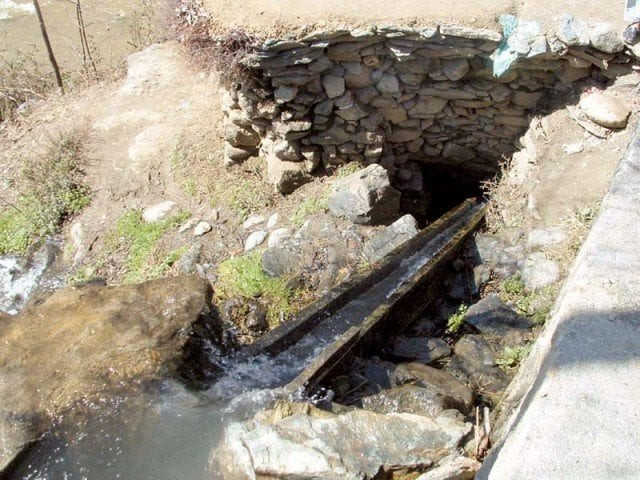Free, clean electricity: Small watermills for country’s big energy crisis
Potential in century-old mud-and-stone mill may make villages self-reliant.

If each of these mills were connected to a small-scale turbine, Arshad believes, villages could become energy self-reliant. PHOTO: EXPRESS
For a few hours a day, a few days a month, the villager in Katahi, about 50 kilometres outside of Muzaffarabad, the capital of Pakistan-administrated Kashmir, grinds maize and wheat with a watermill.
But he sees untapped potential in his century-old mud-and-stone mill, which sits idle most of the time. He wants to use it to generate free, clean electricity.
Arshad, 38, is one of hundreds of millers in Pakistan who make a living using watermills, or ‘jandar’, built along brooks and streams.
If each of these mills were connected to a small-scale turbine, Arshad believes, villages could become energy self-reliant, helping bring an end to the long power outages that have sparked violent protests across Pakistan and his region of Azad Jammu and Kashmir (AJK) over the past few summers.
“Water channelled for watermills can be used to produce electricity for a whole village,” said Arshad, who got the idea after seeing a nearby hydroelectric power station that runs on massive turbines.
Any surplus energy generated could be sold to the government to feed into the national grid, he added.
By May, with the hot weather starting to bake Pakistan’s plains, the country was already facing an energy shortfall of 5,000 megawatts (MW).
AJK also regularly suffers from crippling power shortages, despite producing more energy than it consumes, as energy generated in AJK goes into Pakistan’s national grid, making AJK vulnerable to national load shedding plans.
“Our requirement is 300 megawatts of electricity for the whole of AJK, while production is 1,133 megawatts,” Fayyaz Ali Abbasi, AJK Energy Secretary, told the Thomson Reuters Foundation.
Instead of focusing on large power projects, said Arshad, governments and NGOs should be helping millers install small energy production alongside their jandars. “It would require a maximum investment of half a million rupees ($5,000) on the turbine, the motor and the pipe,” he said. So far, however, no help has come, he said.
Small projects, big benefits?
Some millers have taken it upon themselves to harness the potential of their watermills. Two years ago, Maskeen Qureshi, who lives in the Kohori Tarari hamlet near Muzaffarabad, installed a homemade turbine and a small transferring motor alongside his jandar.
Maskeen’s son helped him make and install the turbine, while a neighboring village leader gave him a small-capacity motor. The generator is connected to lights by copper wiring recycled from telephone cables. The whole project cost Maskeen 50,000 rupees ($500), he said.
The energy his turbine produces lights the mill and a half-dozen houses, all for free. “The turbine uses one-fourth of the water required to run the watermill, and generates enough to light our homes and charge our cellphones,” said Maskeen, 75.
He estimates that with another 100,000 rupees ($1,000) he could fix the turbine to a concrete base and install a higher capacity motor to create a permanent installation that would provide electricity to all 18 houses in the village, day and night.
When pressed about the energy potential of watermills, AJK Minister for Finance Chaudhry Latif Akbar said the government is ready to finance any initiatives involving local communities as stakeholders and said he would ask the Planning and Development Department to look into the best way of doing that.
But for now, millers like Arshad who want to turn water into power are on their own. They are frustrated with the lack of progress.
Published in The Express Tribune, June 3rd, 2015.
Like Business on Facebook, follow @TribuneBiz on Twitter to stay informed and join in the conversation.



















COMMENTS
Comments are moderated and generally will be posted if they are on-topic and not abusive.
For more information, please see our Comments FAQ